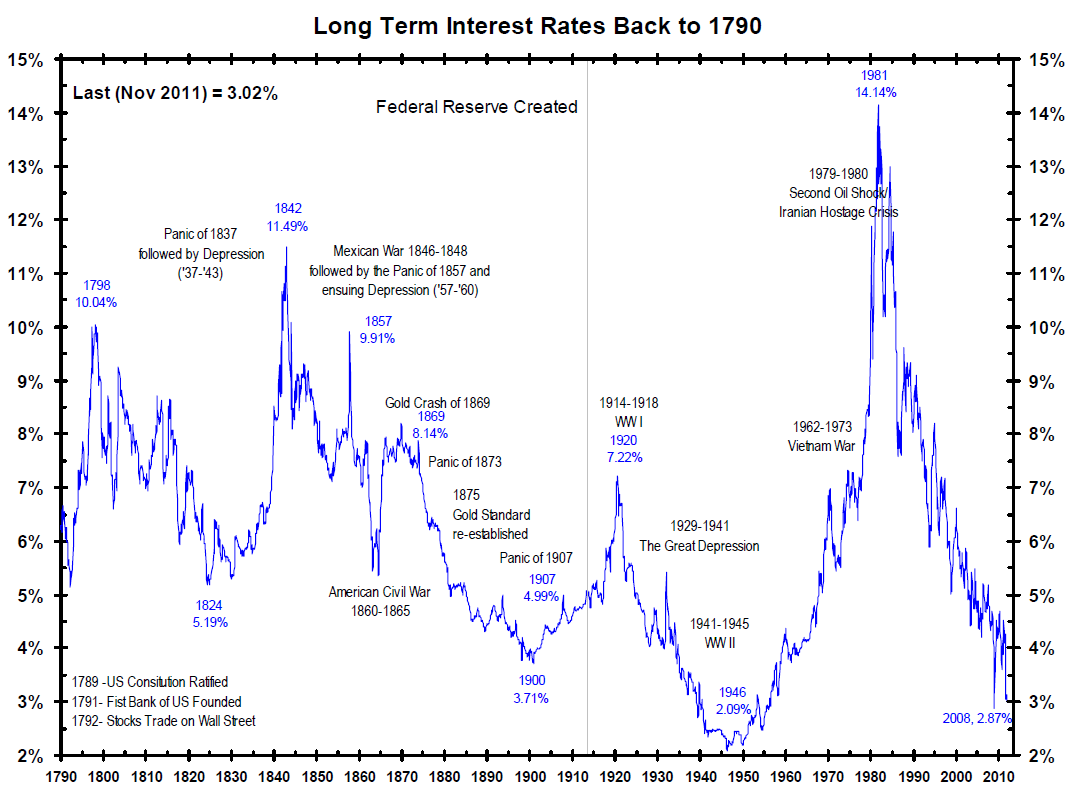Currency
There are all kinds of warning signs in the Financial World these days. For one, WTI Crude in spite of adequate above ground supplies continues to creep higher, closing again higher this week than last. And as we write, WTI is over $96/bbl. It would seem crude is telling us that Price Inflation is intensifying. Not a particularily good sign when interest rates seem to be getting ready to end a long multi-decade decline from the 21% high the Fed Funds hit back in the early 1980’s
The Legendary Financial Writer, Richard Russell expresses justifiable concern. Russell is 88 years old and has seen it all since he climbed out of his B-25 Bomber at the end of WW11 and began his career studying Financial Markets. In this June 11th comment from his terrific Dow Theory Letters, Richard seems to be sounding an alarm of some sort:
“Turning to Bernanke, he practically guarantees that the stock market will go up. Join him and make a guaranteed easy killing. Me, it’s all too much for me. I’m watching the show, and frankly, I’ve never seen anything like it. As for Obama – he has no respect for privacy rights, freedom of the press or due process of the law. The country is going a bit crazy, and the stock market reflects it. As my old friend, the late Eliot Janeway, put it, when the president is in trouble, the market is in trouble. And this president has a lot more troubles than he can handle.
“As for the US, I have the feeling that the wheels are coming off the limousine. The IRS turns out to be a political weapon. Our Attorney General is a liar. We’re being spied on via every e-mail and every telephone call we make.”
Might be time to heed the Russell’s “warning” and start preparing for some big changes. And when interest rates go up……
(click HERE on on image for larger version)
 More than $2.5 trillion in Global Equity Value has been erased since Federal Reserve Chairman Ben S. Bernanke said May 22 the Fed could scale back stimulus efforts should employment show “sustainable improvement.”
More than $2.5 trillion in Global Equity Value has been erased since Federal Reserve Chairman Ben S. Bernanke said May 22 the Fed could scale back stimulus efforts should employment show “sustainable improvement.”
 As you likely know, there has been a lot of damage to emerging market stocks, bonds, and currencies on a relative basis compared to the developed world markets. And you may remember that not too long ago emerging/developing market (EMs) finance ministers were beating the drums of “currency war.” The blame placed squarely on the august shoulders of Mr. Ben Bernanke and company. The IMF was so concerned; they were openly endorsing the use of capital controls to help EMs to handle the pressure. Well, maybe it’s just a cease fire, but EM finance ministers are now intervening to keep their currencies from “depreciating.” How quickly things can change?
As you likely know, there has been a lot of damage to emerging market stocks, bonds, and currencies on a relative basis compared to the developed world markets. And you may remember that not too long ago emerging/developing market (EMs) finance ministers were beating the drums of “currency war.” The blame placed squarely on the august shoulders of Mr. Ben Bernanke and company. The IMF was so concerned; they were openly endorsing the use of capital controls to help EMs to handle the pressure. Well, maybe it’s just a cease fire, but EM finance ministers are now intervening to keep their currencies from “depreciating.” How quickly things can change?
Given the nature of emerging (or developing) world markets, and lack of any depth in their capital markets, i.e. bond markets…
…..read more Currency Currents 12 June 2013 HERE
There has been a tight correlation between the path of the Japanese stock market and the US dollar of late. The Nikkei surged 4.94% overnight. This kind of move suggests the Japanese stock bulls are back in town. Technically, the Nikkei appeared a bit “oversold.” And fundamentally, this surge coincided with good fundamental news (price action confirmed by the news):
Bloomberg 6/10/13: Gross domestic product expanded an annualized 4.1 percent, compared with a preliminary calculation of 3.5 percent, the Cabinet Office said in Tokyo today. Nominal GDP, which is unadjusted for changes in prices, rose 0.6 percent from the previous three months, leaving the economy 7 percent smaller than in the same period in 1997. Consumer confidence in May was at its highest level since 2007, a Cabinet Office survey showed.
Is Abenomics actually working?
Here is a look at the US Dollar Index (black bars) versus the Nikkei 225 Index (orange line): Notice the 200-day moving avage (green line) and the 61.8% retracement level in the US dollar index appear to represent support at the moment fro the buck at the moment.

And in case you didn’t realize, there is also a tight correlation between the Nikkei and $-yen currency pair, i.e. as stocks strengthen in Japan, the yen weakens (USD/JPY rallies).

For some perspective on the Nikkei, a monthly chart going back to the peak in 1989 when it peaked near 40,000. I am not saying we see 40,000 anytime soon, but if more local Japanese investors and international players believe in Abenomics is for real, this market could surprise even the bulls.

The next chart resistance level, using the Sperandeo trend line approach, comes in at 18,295; that’s an increase of about 35% per cent from current levels. Hmmm… Stranger things have happened.
Quotable
“In the midst of increasing mechanization and technological organization, propaganda is simply the means used to prevent these things from being felt as too oppressive and to persuade man to submit with good grace.” – Jacques Ellul, Propaganda
Jack Crooks
Black Swan Capital www.blackswantrading.com
“The eurozone is already in a Japan-trap … What we are seeing in the money supply data and falling monetary velocity is exactly what happened in Japan in the 1990s, yet the ECB seems to think everything is fine.”
-Lars Christensen, Danske Bank
Wait for it … wait for it … Draghi will “save the day” eventually …
Greetings!
The driver of the euro has changed a bit in recent months. Certainly expectations have.
Traders now expect the European Central Bank’s new efforts to support its economies with ultra-easy monetary policy will drive yields lower. And this narrowing yield differential between the US and Europe will weigh on the common currency.
Remember, before, action from the ECB to support economies was seen as alleviating a Sovereign debt problem, reducing pressure on economies and leading the way to growth; and that was bullish for the euro.
Not anymore …
Currency Currents 7 June 2013















